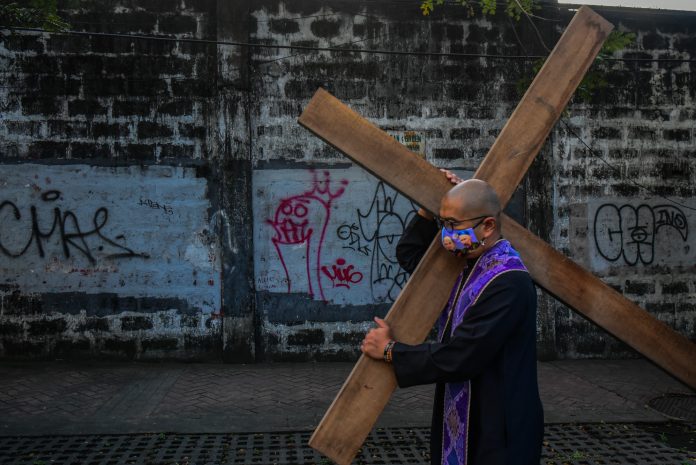“Whoever wants to be my disciple must deny themselves and take up their cross and follow me.” Mt 16:24
As we once again celebrate the paschal mystery – the suffering, death, and resurrection of Jesus – our thoughts usually focus on the cross even if the climax of Jesus’ story is his rising from the dead.
The cross, rather than the lighted paschal candle, has become the ultimate symbol of Christianity. When asked why, our immediate answer is: that it was on the cross that Jesus suffered and died. Instead of being an Easter people, we Christians tend to be Good Friday people. We prefer wearing a small cross around our neck rather than carrying with us an Easter candle.
It is ironic that during Jesus’ time, the cross was the most painful, shameful, and humiliating punishment that a person had to go through. It was capital punishment often meted out to those accused of rebellion against the Roman Empire. The cross was the ultimate sign of defeat for those who struggled against the Imperium.
So, what is the meaning and significance of the cross for us Christians? What is the meaning of taking up our cross?
When Jesus declared that those who want to be his followers must be willing to take up their cross it did not mean that we should flagellate ourselves or have ourselves crucified for a few minutes like what some do on Good Friday (this has become a tourists attraction). Rather, it means that we must be willing to be rejected and persecuted, to suffer and die like what Jesus went through. This is the cost of discipleship.
Not all suffering and death can be associated with the cross. A person who is ill because of an unhealthy lifestyle cannot claim to carry his or her cross. The cross should not be equated with the deprivation and suffering of the poor and the victims of injustice. To do so would make Christianity an opium of the people teaching them to passively accept their lot without struggling against their oppressors. One who is prosecuted and imprisoned for sexual abuse, exploitation, and other crimes or immoral conduct cannot claim to be carrying his cross even if he is a religious leader or claim to be the appointed son of God.
We have to correct the notion that the suffering and death of Jesus on the cross was an act of appeasing an angry God offended by sinful humanity. Rather it was the consequence of Jesus’ carrying out his messianic mission – the prophetic mission of denouncing sin and evil in all its form and announcing the inbreaking of the reign of God – a kingdom of justice, peace, and love which he established and will be fully realized at the end of time (this is not to be equated with the Kingdom of Jesus Christ in Davao). For Jesus, this mission requires being a suffering servant and offering his life. This is the only way for Jesus to fulfill his liberating mission. It presupposes the rejection of the diabolical temptation – of being motivated by the drive for sensual pleasure, material possession, power, and fame.
Thus, the cross instead of being a sign of defeat and the triumph of the evil empire has become the greatest sign of love that overcomes the power of sin and darkness. It is a love that does not resort to violence to defeat the forces of evil – a love capable of giving one’s life without taking the life of another and thus ending the spiral of hatred and violence. The resurrection of Jesus is proof that his sacrifice on the cross was not in vain. The power of the cross has cast its shadows not just over the Roman empire but has spread throughout the whole world.
For us Christians, following Jesus requires continuing his messianic mission which is fulfilled through self-denial and taking up our cross. We must be ready to suffer and die to fulfill our prophetic and servant mission that will bring about social transformation, justice, and peace in so doing making the reign of God a reality in the world. Our willingness to embrace the cross as an expression of our love for God and the people firmly believing that our sacrifice will not be in vain and assured of the victory promised by Christ’s resurrection.
Fr. Amado Picardal is a Redemptorist priest and human rights and peace advocate. He was executive secretary of the CBCP Episcopal Committee on Basic Ecclesial Communities. He also served as co-executive secretary of the Commission of Justice, Peace, and Integrity of Creation of the Union of Superiors General in Rome.
This article was first published by CBCP Monitor and Rappler.com









